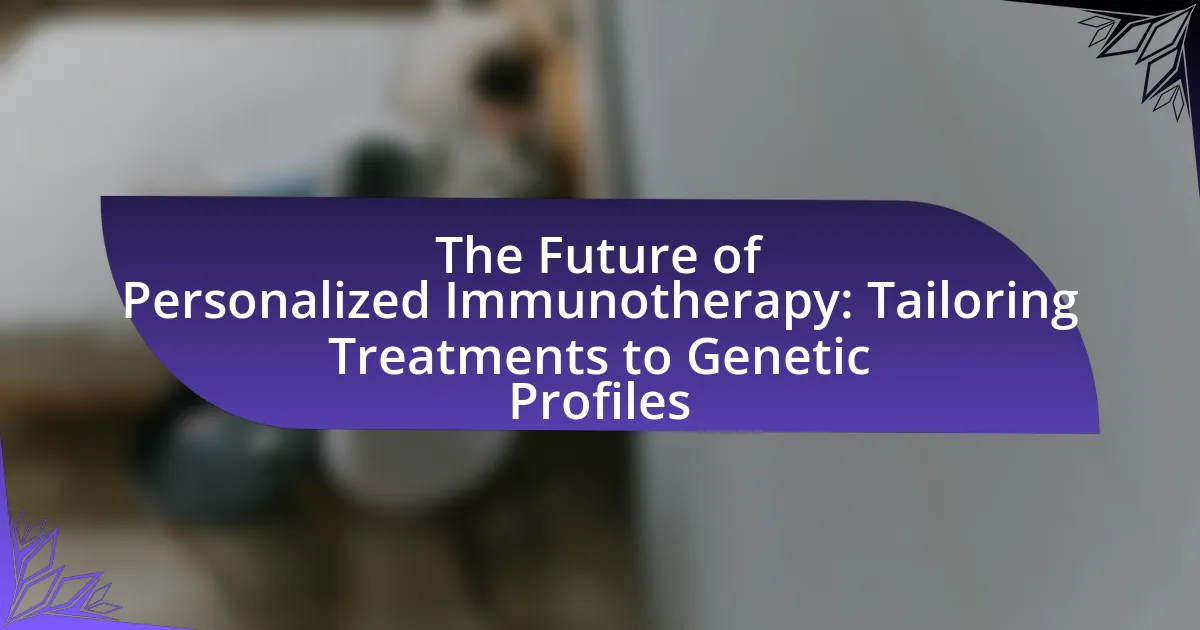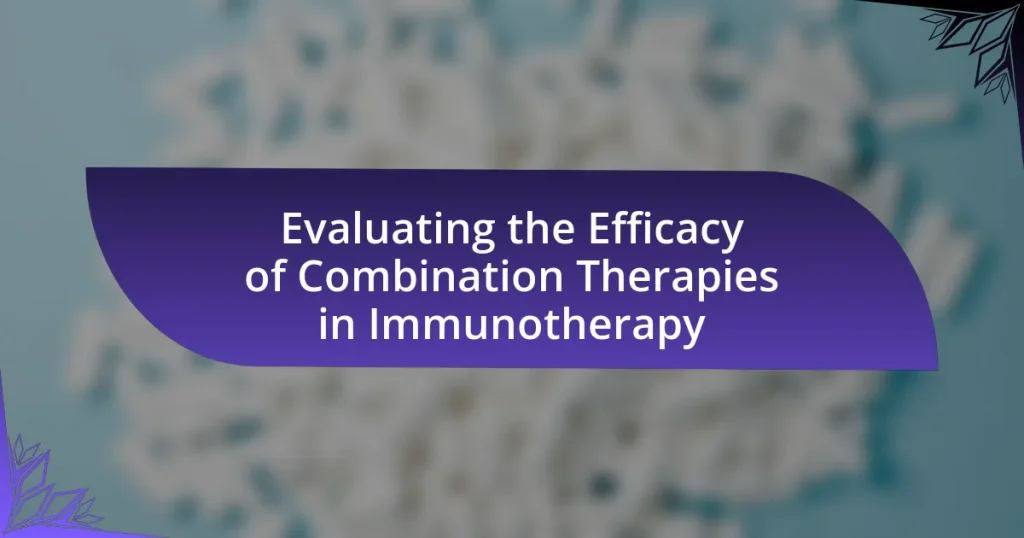Personalized immunotherapy is an advanced cancer treatment approach that customizes therapies based on an individual’s genetic profile, enhancing the immune system’s ability to combat cancer while minimizing side effects. This article explores the differences between personalized immunotherapy and traditional therapies, emphasizing the importance of genetic profiling in treatment customization and the potential for improved patient outcomes. Key advancements, including genomic profiling and artificial intelligence, are discussed, along with the challenges of regulatory hurdles and accessibility. The article also highlights how patients can benefit from personalized immunotherapy, the significance of genetic testing, and best practices for managing treatment effectively.
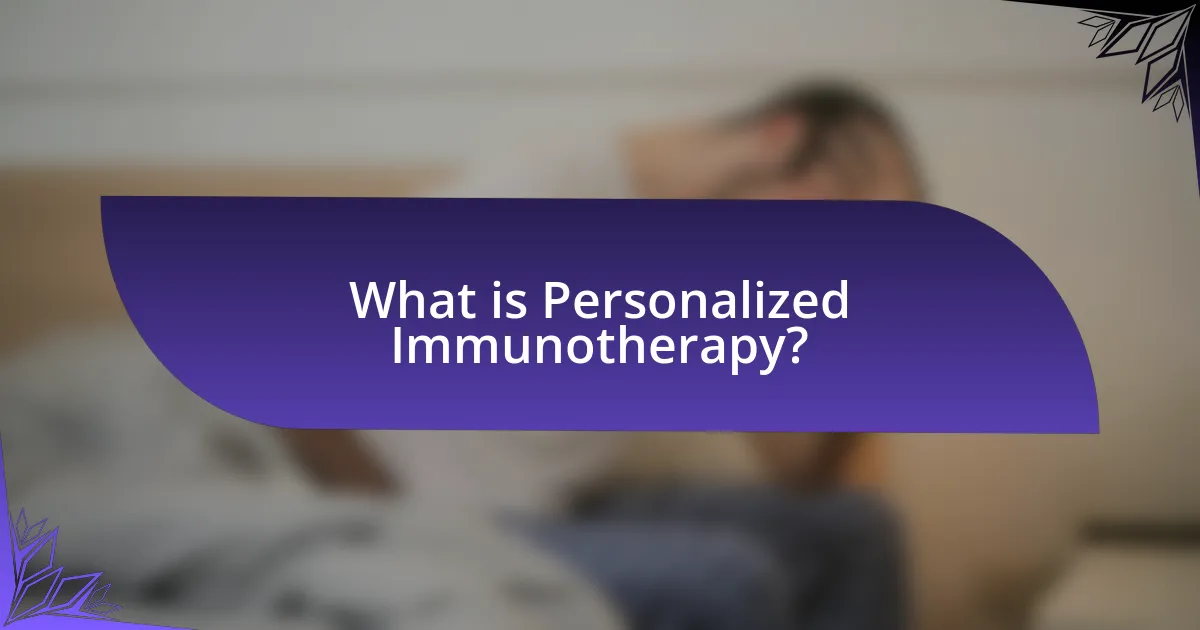
What is Personalized Immunotherapy?
Personalized immunotherapy is a tailored treatment approach that enhances the immune system’s ability to fight cancer by customizing therapies based on an individual’s genetic profile. This method utilizes specific biomarkers and genetic information to identify the most effective immunotherapeutic agents for each patient, thereby improving treatment efficacy and minimizing side effects. Research has shown that personalized immunotherapy can lead to better patient outcomes, as evidenced by studies indicating that treatments aligned with genetic profiles can significantly increase response rates in various cancers, such as melanoma and lung cancer.
How does Personalized Immunotherapy differ from traditional therapies?
Personalized immunotherapy differs from traditional therapies by specifically targeting an individual’s unique genetic and molecular profile to enhance the immune response against cancer. Traditional therapies, such as chemotherapy and radiation, typically employ a one-size-fits-all approach that affects both cancerous and healthy cells, often leading to significant side effects. In contrast, personalized immunotherapy utilizes biomarkers and genetic information to tailor treatments, improving efficacy and minimizing adverse effects. For instance, studies have shown that patients receiving personalized immunotherapy based on their tumor’s genetic makeup have experienced higher response rates compared to those undergoing standard treatments, highlighting the potential for improved outcomes in cancer care.
What are the key principles behind Personalized Immunotherapy?
The key principles behind Personalized Immunotherapy include the customization of treatment based on an individual’s unique genetic and molecular profile, the identification of specific tumor antigens, and the enhancement of the immune response tailored to target those antigens. Personalized Immunotherapy aims to improve efficacy and reduce side effects by utilizing biomarkers to select appropriate therapies, as evidenced by studies showing that treatments aligned with genetic profiles can lead to better patient outcomes. For instance, the use of checkpoint inhibitors has demonstrated significant success in patients with specific genetic mutations, highlighting the importance of tailoring immunotherapy to individual characteristics.
How does genetic profiling play a role in treatment customization?
Genetic profiling plays a crucial role in treatment customization by enabling healthcare providers to tailor therapies based on an individual’s unique genetic makeup. This approach allows for the identification of specific genetic mutations or variations that influence how a patient responds to certain treatments, particularly in fields like oncology and immunotherapy. For instance, studies have shown that patients with specific mutations in genes such as EGFR or ALK can benefit from targeted therapies that are more effective than traditional treatments. By utilizing genetic profiling, clinicians can select the most appropriate and effective treatment options, thereby improving patient outcomes and minimizing adverse effects.
Why is Personalized Immunotherapy important for cancer treatment?
Personalized immunotherapy is important for cancer treatment because it tailors therapies to the unique genetic and molecular profile of an individual’s tumor, enhancing treatment efficacy and minimizing side effects. This approach allows for the identification of specific biomarkers that predict how a patient will respond to certain immunotherapies, leading to more effective and targeted interventions. For instance, studies have shown that patients with tumors expressing specific genetic mutations can benefit significantly from targeted immunotherapies, resulting in improved survival rates and better quality of life. By focusing on the individual characteristics of each patient’s cancer, personalized immunotherapy represents a significant advancement in the fight against cancer, moving away from one-size-fits-all treatments.
What advantages does it offer over conventional cancer treatments?
Personalized immunotherapy offers several advantages over conventional cancer treatments, primarily through its ability to target specific genetic profiles of tumors. This targeted approach enhances treatment efficacy by focusing on the unique characteristics of an individual’s cancer, leading to improved response rates. For instance, studies have shown that patients receiving personalized immunotherapy can experience higher survival rates compared to those undergoing traditional chemotherapy, which often affects both cancerous and healthy cells indiscriminately. Additionally, personalized immunotherapy typically results in fewer side effects, as it minimizes damage to normal tissues, thereby improving the overall quality of life for patients.
How does it improve patient outcomes and reduce side effects?
Personalized immunotherapy improves patient outcomes and reduces side effects by tailoring treatments to individual genetic profiles, allowing for more effective targeting of cancer cells while sparing healthy tissues. This approach enhances the efficacy of treatment, as evidenced by studies showing that patients with specific genetic markers respond better to certain immunotherapies, leading to higher response rates and improved survival outcomes. For instance, research published in the Journal of Clinical Oncology demonstrated that patients with specific mutations had a 50% higher response rate to targeted immunotherapy compared to those receiving standard treatments. Additionally, by minimizing exposure to ineffective therapies, personalized immunotherapy reduces the incidence of adverse effects commonly associated with broader treatment protocols, thereby improving the overall quality of life for patients.
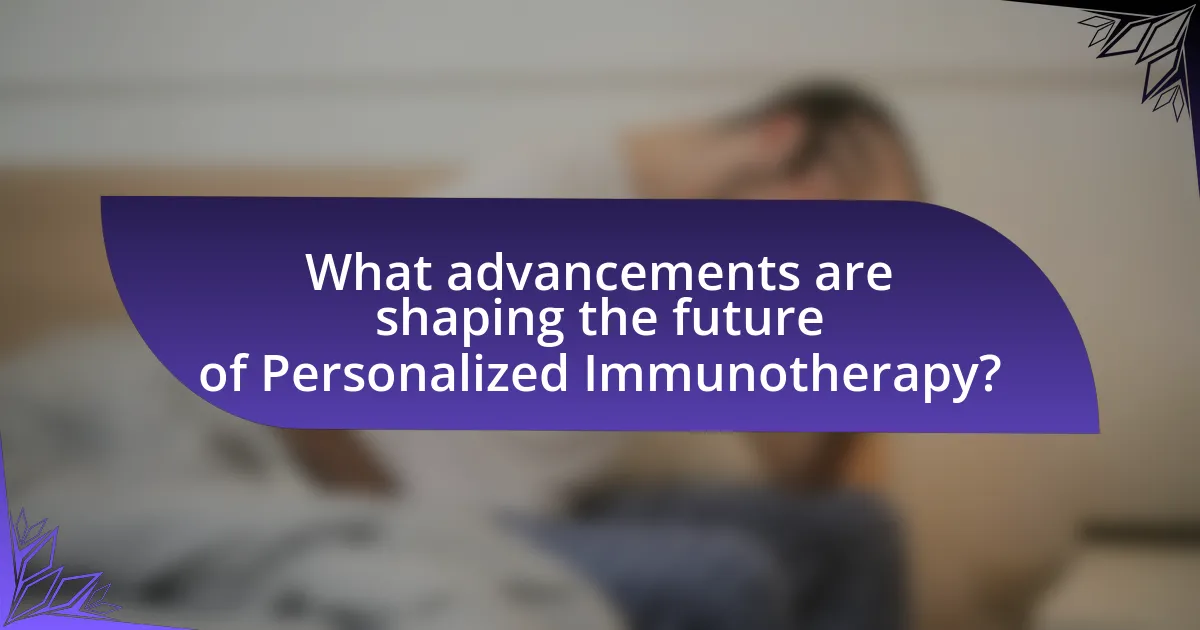
What advancements are shaping the future of Personalized Immunotherapy?
Advancements in personalized immunotherapy are primarily driven by the integration of genomic profiling, artificial intelligence, and novel therapeutic agents. Genomic profiling allows for the identification of specific mutations and biomarkers in individual patients, enabling tailored treatment strategies that enhance efficacy and minimize side effects. Artificial intelligence is being utilized to analyze vast datasets, predicting patient responses to various immunotherapies and optimizing treatment plans. Additionally, the development of new therapeutic agents, such as CAR-T cell therapies and immune checkpoint inhibitors, is expanding the arsenal of personalized treatment options. These advancements are supported by clinical trials demonstrating improved patient outcomes, such as the 2019 study published in the New England Journal of Medicine, which showed a significant increase in survival rates for patients with specific genetic profiles receiving targeted immunotherapy.
How are technological innovations influencing treatment options?
Technological innovations are significantly influencing treatment options by enabling the development of personalized immunotherapy tailored to individual genetic profiles. Advances in genomic sequencing technologies allow for precise identification of genetic mutations and biomarkers associated with various diseases, particularly cancer. For instance, the use of next-generation sequencing (NGS) has revolutionized the ability to analyze tumor DNA, leading to targeted therapies that are more effective and have fewer side effects compared to traditional treatments. Research published in the journal “Nature” by authors such as Garraway and Lander highlights how these innovations facilitate the customization of treatment plans based on a patient’s unique genetic makeup, improving overall treatment outcomes and survival rates.
What role do artificial intelligence and machine learning play?
Artificial intelligence and machine learning play a crucial role in the development of personalized immunotherapy by analyzing vast amounts of genetic data to identify specific biomarkers associated with individual patients’ responses to treatment. These technologies enable the identification of patterns and correlations within complex datasets, allowing for the tailoring of immunotherapy strategies that align with a patient’s unique genetic profile. For instance, studies have shown that machine learning algorithms can predict treatment outcomes based on genetic variations, enhancing the efficacy of therapies and minimizing adverse effects. This data-driven approach is transforming the landscape of cancer treatment, making it more precise and effective.
How are new biomarkers being identified for better targeting?
New biomarkers are being identified for better targeting through advanced genomic sequencing and bioinformatics analysis. These methods allow researchers to analyze the genetic profiles of tumors, identifying specific mutations and expression patterns that can serve as biomarkers for targeted therapies. For instance, studies have shown that next-generation sequencing can uncover actionable mutations in cancer patients, leading to more personalized treatment options. Additionally, machine learning algorithms are increasingly used to predict which biomarkers correlate with treatment responses, enhancing the precision of immunotherapy approaches.
What challenges must be addressed for wider adoption?
Wider adoption of personalized immunotherapy faces several challenges, including high costs, regulatory hurdles, and the need for extensive genetic testing. High costs limit accessibility for patients and healthcare systems, as treatments can exceed hundreds of thousands of dollars. Regulatory hurdles arise from the complexity of approving therapies tailored to individual genetic profiles, which can prolong the time to market. Additionally, the requirement for comprehensive genetic testing to identify suitable candidates for treatment complicates the process, as it necessitates advanced infrastructure and expertise. These factors collectively hinder the scalability and integration of personalized immunotherapy into standard medical practice.
What are the regulatory hurdles facing Personalized Immunotherapy?
Personalized immunotherapy faces several regulatory hurdles, primarily related to the complexity of individualized treatments and the need for robust clinical evidence. Regulatory agencies, such as the FDA, require extensive data demonstrating safety and efficacy for each unique therapy, which can be challenging due to the diverse genetic profiles of patients. Additionally, the lack of standardized manufacturing processes for personalized therapies complicates compliance with Good Manufacturing Practices (GMP). Furthermore, reimbursement policies often lag behind the development of these therapies, creating financial barriers for patients and providers. These factors collectively hinder the timely approval and accessibility of personalized immunotherapy treatments.
How can healthcare systems adapt to integrate these therapies?
Healthcare systems can adapt to integrate personalized immunotherapy by implementing genomic testing protocols to identify patient-specific genetic profiles. This integration requires the establishment of multidisciplinary teams that include oncologists, geneticists, and bioinformaticians to analyze genetic data and tailor treatment plans accordingly. Evidence from studies, such as those published in the Journal of Clinical Oncology, indicates that personalized approaches can significantly improve patient outcomes, with targeted therapies showing higher efficacy in specific genetic contexts. Additionally, healthcare systems must invest in training healthcare professionals on the latest advancements in immunotherapy and ensure that reimbursement policies support these innovative treatments, as demonstrated by the increasing adoption of precision medicine frameworks in leading cancer centers.
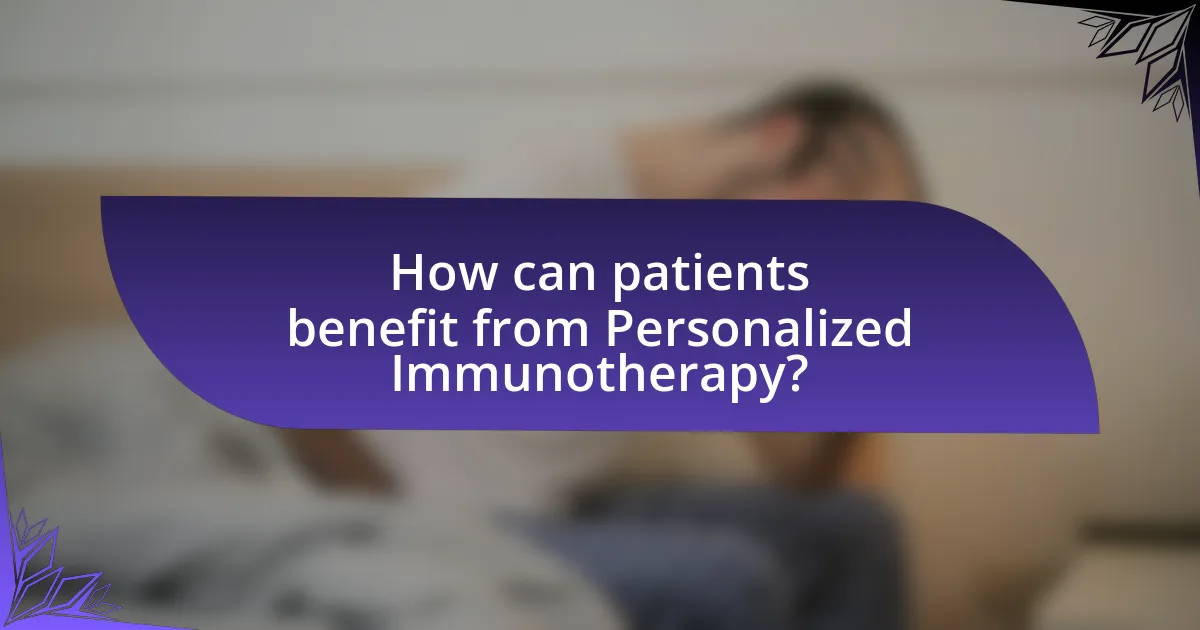
How can patients benefit from Personalized Immunotherapy?
Patients can benefit from Personalized Immunotherapy by receiving treatments specifically tailored to their unique genetic profiles, which enhances the effectiveness of the therapy. This individualized approach allows for the targeting of specific cancer cells while minimizing damage to healthy tissues, leading to improved treatment outcomes. Studies have shown that patients undergoing personalized immunotherapy experience higher response rates and fewer side effects compared to traditional therapies. For instance, a clinical trial published in the Journal of Clinical Oncology demonstrated that patients with specific genetic mutations responded significantly better to targeted immunotherapy than those receiving standard treatments.
What should patients know about genetic testing?
Patients should know that genetic testing can provide critical insights into their health and potential treatment options. Genetic testing analyzes an individual’s DNA to identify mutations or variations that may influence disease risk, treatment response, and overall health management. For instance, studies have shown that genetic testing can guide personalized immunotherapy by identifying specific biomarkers that predict how well a patient will respond to certain treatments, such as checkpoint inhibitors in cancer therapy. This tailored approach can significantly improve treatment efficacy and minimize adverse effects, as evidenced by research published in the Journal of Clinical Oncology, which highlights the role of genetic profiling in optimizing cancer treatment strategies.
How can genetic profiles influence treatment decisions?
Genetic profiles can significantly influence treatment decisions by identifying specific mutations and biomarkers that predict a patient’s response to therapies. For instance, in oncology, the presence of mutations in genes such as EGFR or ALK can determine the suitability of targeted therapies like gefitinib or crizotinib, respectively. Studies have shown that patients with these genetic alterations often experience better outcomes when treated with targeted agents compared to traditional chemotherapy, as evidenced by clinical trials demonstrating improved progression-free survival rates. Thus, utilizing genetic profiles allows healthcare providers to tailor treatments more effectively, enhancing therapeutic efficacy and minimizing unnecessary side effects.
What are the potential risks and benefits of genetic testing?
Genetic testing offers significant benefits, such as identifying genetic predispositions to diseases, which can lead to early interventions and personalized treatment plans. For instance, studies show that genetic testing can inform decisions in cancer treatment, allowing for targeted therapies that improve patient outcomes. However, potential risks include psychological impacts from test results, such as anxiety or depression, and privacy concerns regarding the handling of sensitive genetic information. Research indicates that about 25% of individuals experience distress after receiving genetic test results, highlighting the emotional implications of such testing.
What steps can patients take to access Personalized Immunotherapy?
Patients can access Personalized Immunotherapy by first consulting with their healthcare provider to discuss their specific cancer diagnosis and treatment options. Following this, patients should seek genetic testing to identify biomarkers that may influence their response to immunotherapy. Once genetic information is obtained, patients can work with oncologists who specialize in personalized medicine to evaluate suitable immunotherapy options based on their genetic profile. Additionally, patients may consider enrolling in clinical trials that focus on personalized immunotherapy, as these trials often provide access to cutting-edge treatments tailored to individual genetic characteristics.
How can patients find clinical trials for new therapies?
Patients can find clinical trials for new therapies by utilizing online databases such as ClinicalTrials.gov, which lists ongoing and completed trials worldwide. This resource provides detailed information about the trials, including eligibility criteria, locations, and contact information for researchers. Additionally, patients can consult their healthcare providers, who may have access to information about local trials or can refer them to specialists involved in clinical research. Research institutions and hospitals often have dedicated clinical trial offices that can assist patients in identifying suitable trials based on their specific conditions and genetic profiles, particularly in the context of personalized immunotherapy.
What questions should patients ask their healthcare providers?
Patients should ask their healthcare providers about the specific genetic tests available for personalized immunotherapy. Understanding which tests can identify relevant biomarkers is crucial, as these tests guide treatment decisions tailored to individual genetic profiles. Additionally, patients should inquire about how the results of these tests will influence their treatment options and the potential benefits and risks associated with personalized immunotherapy. Research indicates that personalized approaches can improve treatment efficacy and reduce adverse effects, making these questions vital for informed decision-making.
What are the best practices for managing Personalized Immunotherapy treatments?
The best practices for managing Personalized Immunotherapy treatments include thorough patient assessment, continuous monitoring, and individualized treatment plans. Thorough patient assessment involves evaluating genetic profiles, tumor characteristics, and previous treatment responses to tailor therapies effectively. Continuous monitoring is essential to track treatment efficacy and manage potential side effects, ensuring timely adjustments to the therapy as needed. Individualized treatment plans should be based on the unique biological markers of each patient, as evidenced by studies showing improved outcomes when therapies are matched to specific genetic alterations. For instance, the use of targeted therapies in patients with specific mutations has demonstrated higher response rates, reinforcing the importance of personalized approaches in immunotherapy management.
How can patients monitor their response to treatment effectively?
Patients can effectively monitor their response to treatment by regularly tracking symptoms, side effects, and any changes in health status through a structured journal or digital health app. This method allows patients to document their experiences and identify patterns related to their treatment, which can be shared with healthcare providers for more informed decision-making. Research indicates that self-monitoring can lead to improved health outcomes, as it encourages active patient engagement and facilitates timely adjustments to treatment plans based on real-time feedback.
What lifestyle changes can support the effectiveness of these therapies?
Adopting a balanced diet, regular exercise, and stress management techniques can significantly enhance the effectiveness of personalized immunotherapy. A balanced diet rich in antioxidants, vitamins, and minerals supports immune function, as evidenced by studies showing that nutrients like vitamin D and omega-3 fatty acids can improve immune responses. Regular physical activity has been linked to better treatment outcomes in cancer patients, with research indicating that exercise can enhance immune system activity and reduce inflammation. Additionally, managing stress through mindfulness or relaxation techniques can positively influence immune function, as chronic stress is known to suppress immune responses. These lifestyle changes collectively create an environment that supports the body’s ability to respond to immunotherapy effectively.
